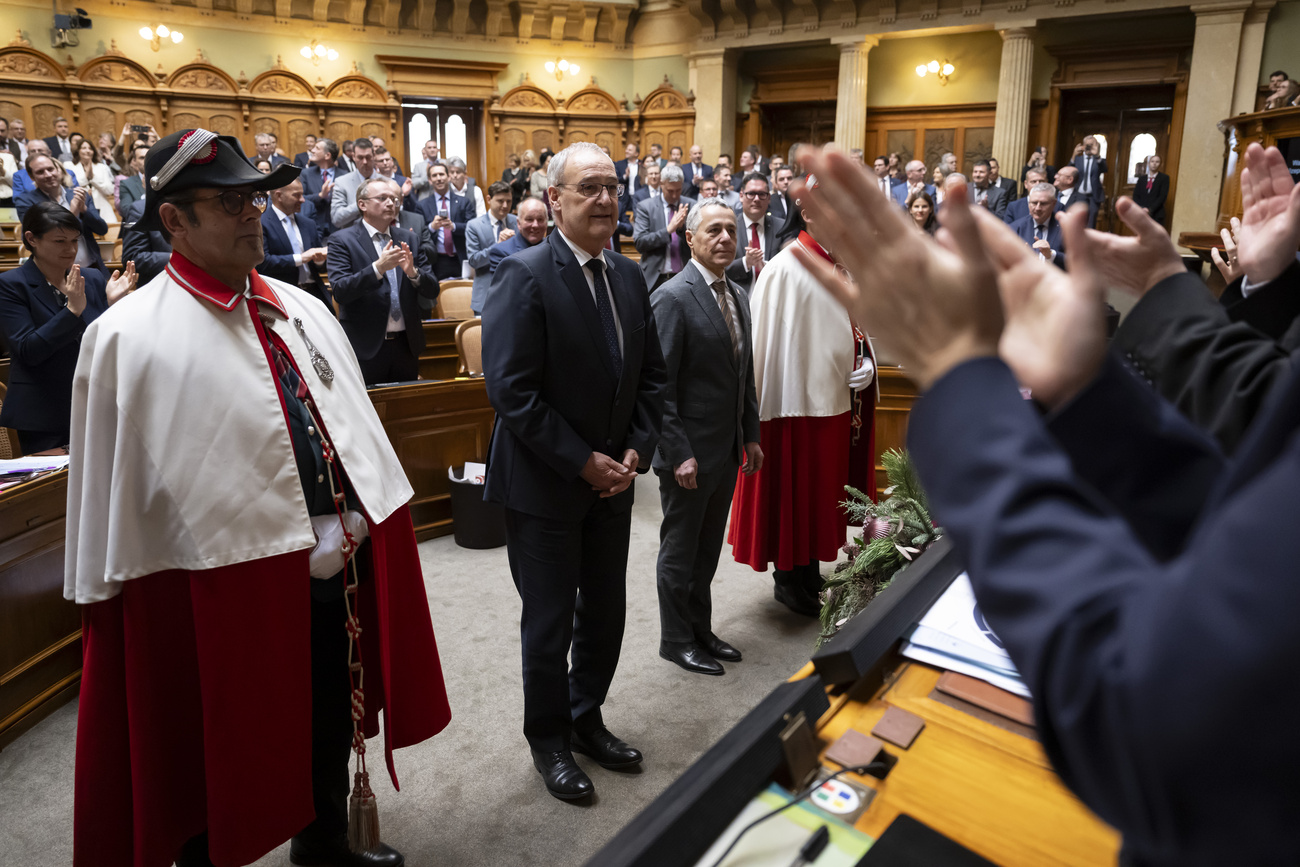
Americans overseas: friends don’t let friends not vote
Americans may be happy getting on with their lives overseas but they have a duty to cast a vote to shape politics back home, or so argues Alexandra Dufresne.
I recently began teaching American law here in Switzerland. On the first day of class, I asked the students to share questions they had about law and policy in the United States. Three questions were by far the most common: why do you have the death penalty, why do you not regulate guns more strictly, and how could Trump possibly have been elected?
“Hmm. Let me get back to you on the last one,” I said.
I still don’t know the answer, though I ask myself the question every morning when I read the newspaper. There are so many factors at play. But one factor (of many) may have been voter turnout – or lack thereof.
How did this happen?
In the 2016 Presidential election, only about 58 to 60% of eligible voters voted, depending on how one calculates the pool of “eligible voters”. This means that only about 26% of the American electorate voted for Mr. Trump.
The voter turnout figures from Americans living abroad are much worse. According to the U.S. Election Assistance Commission, 633,000 Americans voted from abroad in the 2016 Presidential election and only 93,000 voted from abroad in the 2014 midterm Congressional elections. Estimates of the number of Americans abroad range from 2.6 to 9 million, with the federal government estimating the total at about 5.7 million and the population of eligible voters (given that people under 18 cannot vote) at about 2.6 million. (This 5.7 million figure would make us the equivalent of approximately the 20th most populous state, about the size of Colorado, Minnesota or Wisconsin). The Overseas Vote Foundation estimates that the voting rate for eligible overseas voters in the 2014 midterm elections was 4%. Even if you take the much higher 633,000 number for the 2016 Presidential election and divide it by 2.6 million, you get only 24%.
This is embarrassing and shameful for a country that (used to) pride itself for its democracy. But it’s much more than embarrassing – it’s dangerous.
It has been yet another bad few days in the news – yet more school children shot, the appointment of Gina Haspel as Director of the CIA, the forced separation of parents and children seeking refuge at the border – and yet people still cling to a strange belief that we have hit rock bottom, because things could not get any more heartbreaking or absurd. I spent many years practicing and teaching refugee law. If there’s one thing I have learned from my clients, it is that things can always get worse – much, much worse. How could we possibly think that we are special, that “American exceptionalism” is real, that things could not get worse?
A shot at redemption
But we still have a chance to redeem ourselves. There are critical midterm Congressional elections in November 2018. Although data from 2014 and 2016 show that seven times as many Americans abroad voted in the Presidential election than in the midterm Congressional elections, midterm Congressional elections often turn out to be equally – or more – important.
Why? First, Congressional districts are small, turnout is relatively low, and many elections are expected to be very close, meaning that the chances of your particular vote making a difference is significant.
Second, the Congress can hold the President accountable, through impeachment (if warranted), by refusing to pass or fund the legislation he proposes, or (in the case of the Senate) by refusing to confirm his appointments. As we discuss frequently in class, our entire system is built on the idea of the separation of powers. Our government is a three-legged stool — remove one leg and the stool can no longer bear weight, and it topples over. But separation of powers only works if the Congress does its job and vigilantly guards against Executive overreach. And Congress can only do its job if it is actually represents the will of the American people.
For better or worse, Congress members are not selected and do not make decisions based on what we say on social media or over the dinner table. They cannot hear what we say to one another. They are selected and make decisions based on our votes. If some current Members of Congress refuse to protect our values and if we do not vote them out in November 2018, then it is no one’s fault but our own.
No excuses
A lot of Americans I meet abroad are adept at making excuses for not voting. I have heard some creative ones. If they are dual citizens, it feels like double dipping. If they come from states that are clearly “red” or “blue,” they argue that their vote wouldn’t make a difference. Some are concerned about tax implications for voting in federal elections. Others decry the role money plays in corrupting politicians on all sides.
Fortunately for our democracy, these excuses do not hold water. Many Congressional seats are genuinely up for grabs this election. Overseas votes did, in fact, help determine the outcome in two Congressional elections: Jim Webb’s 2006 victory in Virginia and Al Franken’s 2008 victory in Minnesota. The March 2018 special election in Pennsylvania was decided by a small number of absentee ballots (though it is unknown whether those absentee ballots came from absentee voters overseas or elsewhere). More fundamentally, the basic rule of almost all ethical systems is that we should behave as we would want everyone else to behave. Otherwise, your goat will eat up too much of the grass in the commons, and we will all starve.

And to be clear: there are no tax implications for voting in any federal elections. (There may be tax implications for voting in state elections, depending on what state you are from). Voting in federal elections for President, Senator, or Members of the House of Representatives is your right, per the 1975 Overseas Citizens Voting Right Act.
If you are concerned about having “too many” benefits as a dual citizen — somehow you are “double dipping” at democracy — then fine: research a bit on how disenfranchised people in America (immigrants, children, people too sick or poor to go to the polls, people without access to drivers’ licenses or other identification, people who can’t take the time off work, and people stripped of voting rights due to criminal convictions) are feeling right now and imagine you are voting in their stead.
If you are concerned about the corrupting influence of money in elections, then join the club. But the proper response is to engage in more political action, not less.
And finally, if you are too busy, can I just ask what you are doing? Ordinary people — mothers of young children, businesspeople, scientists — in America are taking to the streets and suffering the exhaustion and public scrutiny inherent in running for office. If they have time to run for office, surely we have time to spend the 10 minutes it takes to register to vote and the 10-30 minutes it takes to send in the ballot. There are indeed a number of factors that lead to the effective disenfranchisement of large numbers of low-income and minority voters, and these barriers to voting absolutely must be dismantled. But these barriers do not explain why many Americans abroad (who tend to have identity documentation, not to be extremely low-income, and not need to take off time from work to mail in their absentee ballots) do not vote.
More fundamentally, none of the excuses above hold water at a time like this: a time when our basic institutions and most fundamental beliefs — the very things bind us together as Americans — are under threat. You may have come up with some good reasons not to vote, but the arguments on the other side are stronger.
We are the adults in the room
Because there is a time in your life when you realize, with a jolt in the pit of your stomach, that you have to take a seat at the table, because you are now one of the adults in the room. We are the adults in the room. And there are certain things decent adults do, not because they want to, but because they are decent. Registering to vote is on that list. And so is talking to others about registering to vote. It may take time and be slightly awkward. But so are many of the things we do — not because we want to but because the costs of not doing so are unbearable.
In that vein, an all-volunteer group of 300 Swiss and Americans that I help lead has made a series of silly, funny, 60-second skits on Youtube designed to encourage Americans abroad to register to vote in the 2018 midterm congressional election. Many of the skits poke fun at the challenges of living abroad and the mistakes Americans make when speaking German, under the theme that some aspects of living abroad are hard, but voting is not. The videos can be found hereExternal link. They give information for the voter registration website: votefromabroad.org This quick and easy-to-use website was created by Democrats Abroad, but you can use it to register to vote regardless of whom you plan to vote for. If you feel more comfortable using a purely nonpartisan website, go to overseasvotefoundation.org. You can also find voting information on the State Department website.
The volunteers in our group are lawyers, scientists, teachers, mothers, business people, academics, IT professionals, ministers, retired people, students, fathers. We spent collectively hundreds of hours making these skits not because we are fabulous actors, screenplay writers, and directors (though Chris Völke, the young Swiss film director who volunteered his time and expertise to direct these videos actually is, as is the Swiss comedian Eddie Ramirez, who stars in one of the skits). We did so because democracy is important to us. And we are committed to doing everything we can to not let fellow Americans sit this election out. Many states’ registration deadlines are fast approaching. It’s time to take care of this.Because if we as ordinary Americans don’t encourage one another to step up to the plate to register to vote, who will?
Opinion series
swissinfo.ch publishes op-ed articles by contributors writing on a wide range of topics – Swiss issues or those that impact Switzerland. The selection of articles presents a diversity of opinions designed to enrich the debate on the issues discussed.

More
Applying to be Swiss in the Trump era

More
Where the American dream remains democratic

In compliance with the JTI standards
More: SWI swissinfo.ch certified by the Journalism Trust Initiative































You can find an overview of ongoing debates with our journalists here . Please join us!
If you want to start a conversation about a topic raised in this article or want to report factual errors, email us at english@swissinfo.ch.